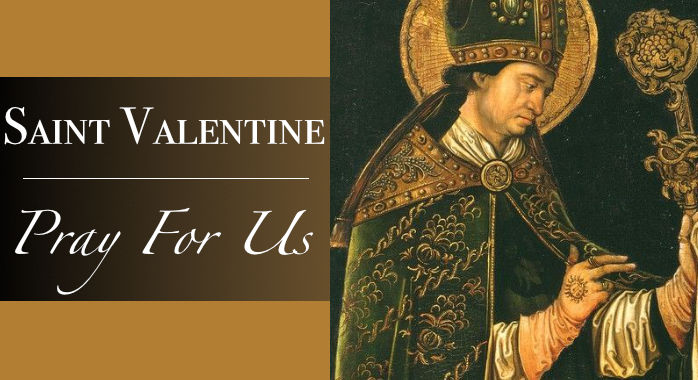SAINT VALENTINE AND THE ROOTS OF WESTERN CIVILIZATION
SAINT
VALENTINE AND THE ROOTS OF WESTERN CIVILIZATION
We
really do not know for sure who he was. There
are actually several Saint Valentines whose names are recorded in lists of
early Church martyrs who have a connection with February 14 and who lived in
the second half of the third century.
One of them is described as a priest of Rome, another as a bishop in
central Italy. They are described in different
narratives as having been martyred near Rome.
They may actually refer to the same person, but historians are not sure. Pope Julius I (d. 352) reportedly built a basilica
over the grave where Saint Valentine was buried. The fact that all we know for certain is that
he was a martyr is the reason for his removal from the official calendar of feast
days in 1969.
How
did Saint Valentine become associated with a day devoted to lovers? The Catholic Encyclopedia suggests that the
roots are found in a common belief in England and France in the Middle Ages that
on February 14 birds would begin to pair.
The famous English poet Geoffrey Chaucer, who wrote “The Canterbury
Tales,” may be the source of the association of the feast day with lovers. In “Parlement of Foules” he wrote: For
this was sent on Seynt Valentyne's day, Whan every foul cometh ther to choose
his mate. According to legend the
Saint addressed a letter to his jailer’s pretty daughter as “from your
Valentine.” Another legend claims that
Valentine defied the emperor’s command by secretly presiding at marriages to
spare grooms from having to go to war!
Valentine’s
Day was a big deal in my elementary school.
We always had a party in the classroom.
The students exchanged cheap Valentine cards with one another, and boys
would make one for their mothers. I
remember giving a Valentine card not only to a neighbor friend but also to her
sisters, so that they wouldn’t be jealous!
Western society has moved far away from the formerly dominant influence
of the Roman Catholic Church, but Valentine’s Day is a vestige of this past. Other holidays also go back to Western
civilization’s Catholic roots, most notably Christmas, of course. Today it is celebrated by the majority of
folks more like a winter holiday than the Nativity of the Savior (as a little
kid I used to wonder what the Baby Jesus had to do with Santa). Another holdover is Mardi Gras, brought to
America by French immigrants, which provides an excuse for debauchery in New
Orleans and elsewhere every year but at one time was a serious day of
preparation for the beginning of Lent.
Even now, exactly at midnight, the mounted police lead a parade of
street cleaners on Bourbon Street as the revelry is supposed to end with the
beginning of Ash Wednesday, a day set aside for prayer and fasting. However, it would be quite a miracle if
everyone suddenly became sober at 12 a.m.!
Some
young people might not know that Sunday was considered a special day of the
week long before the creation of the National Football League. Many states and towns had “blue laws” that
kept shops and bars closed on Sundays. In
my opinion it is unfortunate that we have moved away so radically as a society
from the observance of Sunday. Apart
from the fact that every person and every community is morally obligated to
honor and reverence God, we should also regret that there is not at least one
day of the week which is free from work and making money. I took a course on Judaism at the Lutheran
seminary in Germantown, and I remember the Rabbi speaking not only about the
religious sense of the Sabbath, but also of how humanly necessary it is to have
a weekly day of rest. The loss of Sunday
is only one of many positive influences of Christianity that our progressively
secular society has turned away from.
A strong
argument has been made by many scholars, Christian and non-Christian, that the
best values which are honored in our society today are a direct result of the
influence of Christianity. Such values as
the notion of universal human rights, of equal dignity, of a duty to the poor, the
sanctity of marriage, and the pursuit for peace have their seeds in the
Gospel. While they were never lived
perfectly at any time, they are ideals that uniquely developed in Christian
civilization. They still continue to
influence public discourse and policy, but the loss of the fear of God leads
also to the loss of common sense, as is evidenced when human rights do not
include unborn human beings and nations can happily come together to celebrate
the Olympics in a country that practices human slavery and genocide.
Dear Saint
Valentine, Pray for us!




Comments
Post a Comment